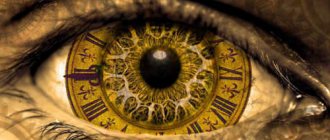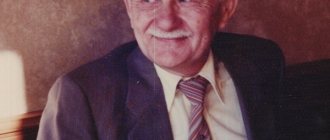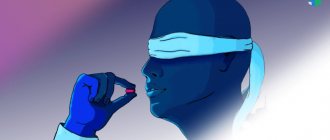Sometimes you get the feeling that the events that are happening have already happened . A person hears the same sounds, inhales smells, and predicts what the interlocutor will say. Consciousness throws up pictures of what is happening, but does not answer the question of when such an event occurred. This means that this is a deja vu phenomenon , and it occurs during life in 97% of the population. Particularly surprising are situations when, when we see a stranger and when visiting a new room, we can describe in detail facial features or furnishings. It becomes creepy and a little uncomfortable. Don’t even try to remember when familiar events happened, it’s impossible. Why does the feeling of déjà vu occur ?
Deja vu: what is it?
The state experienced by a person is comparable to watching a movie or reading a book that you have already read or viewed for a long time. Individual pictures and motives appear in the head, but memory does not show how further events will develop. When the situation develops, the person realizes with surprise that this is exactly how everything should have happened. What remains is a strange feeling, the understanding that you knew the sequence of development of the situation . The meaning of deja vu in your own words: all this happened once before, I saw it (heard it, felt it) and is repeating it again. Below we will find out how the word déjà vu is translated from French - its content literally reflects the meaning of the phenomenon itself in a nutshell.
A man in a state of déjà vu is confused
Feeling of deja vu - what is it? The word “déjà vu” by definition means that it is “something that has already been seen.” The phenomenon itself is an amazing phenomenon that scientists are still struggling with to this day. The difficulty of research lies in the fact that it is impossible to predict the occurrence of déjà vu. Consequently, it is impossible to prepare a person for studies and observations. Cases of repeated déjà vu several times a week have been recorded in people suffering from epilepsy.
Thanks to Emile Boirac, this term appeared: the psychologist called the unusual phenomenon déjà vu. Readers found a new designation in the scientist’s works “Psychology of the Future.” Previously, the phenomenon was characterized by the same signs, but was called false recognition or paramnesia. The latter term meant impaired consciousness and memory deceptions . Very often, the phenomenon of déjà vu, on the contrary, does not lead to serious psychological problems in a person’s normal life.
Dejavu (déjà vu), which translated from French means “already seen,” naturally came into use in other nations
Russians often have a question: what is the correct spelling: deja vu, déjà vu or déjà vu? Despite the fact that the French version consists of two words (déjà vu), in Russian the analogue is written together, in one word: “déjà vu ”. This is the writing we will adhere to.
How does the reverse déjà vu phenomenon occur, a kind of antonym of déjà vu? This phenomenon is rare, unlike deja vu, and also has a French designation - jamevu . Accompanied by a sharp loss of memory: a person does not recognize close or familiar people, he perceives familiar things as new. Jamevu occurs unexpectedly, for example, during a conversation with a friend. At one point, all data is erased from memory. Repetition of jamevu indicates the presence of mental disorders.
Literature
- Carson R., Butcher J., Mineka S. Abnormal psychology. St. Petersburg: Peter, 2004. - 1167 pp.;
- Dobrokhotova T.A., Bragina N.N. Functional asymmetry and psychopathology of focal brain lesions. M.: Medicine, 1977. - 359 pp.;
- Adachi N., Koutroumanidis M., Elwes R. D. C. (1999). Interictal 18FDG PET findings in temporal lobe epilepsy with déjà vu. J. Neuropsychiatry Clin. Neurosci. 11, 380–386;
- Sno H. N. and Linszen D. H. (1990). The déjà vu experience: remembrance of things past? Am. J. Psychiatry. 147, 1587–1595;
- Warren-Gash, C. and Zeman, A. (2003). Déjà vu. Pract. Neurol. 3, 106–109;
- Kurgan A.A. The phenomenon of deja vu. St. Petersburg: Dmitry Bulanin, 2010. - 154 p.;
- Korb E., Wilkinson C. L., Delgado R. N., Lovero K. L., Finkbeiner S. (2013). Arc in the nucleus regulates PML-dependent GluA1 transcription and homeostatic plasticity. Nat. Neurosci. 16, 874–883;
- Rybin D.N. Value-semantic determination of the phenomenon of derealization: dis. ...cand. psychol. Sci. - Barnaul, 2005. - 156 p.;
- Brown AS (2003). A review of the déjà vu experience. Psychol. Bull. 129, 394–413;
- Jackson JH and Colman W S (1898). Case of epilepsy with tasting movements and “dreamy state”: very small patch of softening in the left uncinate gyrus. Brain. 21, 580–590;
- Neppe V. M. (1983). The concept of déjà vu. Parapsychology Journal of South Africa. 4, 1–10;
- Karlov V.A. (2007). Mental disorders in epilepsy. Annals of Neurology. 2, 9–16;
- Richardson T. F. and Winokur G. (1967). Déjà vu in psychiatric and neurosurgical patients. Arch. Gen. Psychiatry. 17, 622–625;
- Gloor P., Olivier A., Quesney L.F., Andermann F., Horowitz S. (1982). The role of the limbic system in experiential phenomena of temporal lobe epilepsy. Ann. Neurol. 12 (2), 129–144;
- https://biomolecula.ru#;
- Spatt J. (2002). Déjà vu: possible parahippocampal mechanisms. J. Neuropsychiatry Clin. Neurosci. 14, 6–10;
- Goodale M. A. and Milner A. D. (1992). Separate pathways for perception and action. Trends Neurosci. 15 (1), 20-25..
Deja vu: what does this mean according to scientists?
Researchers have not learned how to artificially cause the phenomenon. Therefore, take the facts presented below as a theory based on a survey of people who experienced déjà vu. Why and what causes déjà vu syndrome according to scientists?
Many scientists believe that déjà vu occurs due to the layering of similar situations
- Layering of situations . The theory was put forward by Andrey Kurgan. A modern author in the book “The Deja Vu Phenomenon” argues that the main reason for the phenomenon is the layering of similar situations. Moreover, one of them is recorded in the past, and the other occurs in the present. Deja vu happens under special circumstances. There is a time shift. As a result, a person perceives the future as present events. There is a stretching of the future tense, the inclusion of past and present incidents. On the pages of the book you will find examples from life. Readers claim that the situations described completely coincide with the sensations that a person experiences when faced with déjà vu.
- Fast information processing . A rested person perceives what is happening better. An unloaded brain quickly processes the pictures it sees, the information it receives, and the words it hears. The theory comes from physiologist William H. Burnham. An American scientist claims that when seeing an unfamiliar object, the brain begins to process information, reading the smallest details. A rested brain center works quickly. A person perceives information processing differently. There is a feeling of repeating incidents.
- Recording events in the form of holograms . Herman Sno argued that memory is stored in the human brain in a special way. According to the scientist, events are recorded in the form of a three-dimensional image (hologram). Each piece of the picture includes enough data to reproduce the entire image. Clarity depends on the size of the picture. Déjà vu occurs as a result of an overlapping connection between the present and elements of the recorded past. The hologram evokes the whole picture, leaving a feeling of repeated incidents.
- Systematicity of memory . Some of the most recent research, conducted in the 90s, belongs to Pierre Glour. According to the neuropsychiatrist's hypothesis, a person records information through two processes: recognition and recovery. Déjà vu occurs due to a violation of the sequence. In such a situation, when the picture is changed, a person recognizes what is happening, but data recovery does not occur.
The puzzle with such a condition as deja vu has still not been solved.
Psychologist Sigmund Freud did not ignore the topic of deja vu. The Australian is confident that the phenomenon arises thanks to the human consciousness : it throws up subconscious pictures and fantasizes. The hypothesis was picked up by Freud's followers and brought to the theory of the struggle between “I” and “It”.
Why does deja vu happen?
There are various hypotheses put forward by scientists from all over the world. It is interesting that not only psychologists, but also physicists joined the study of the phenomenon. The latter are sure that a person feels déjà vu due to a disruption in time . In ordinary life, a person’s consciousness perceives only what is happening at the present moment. During a failure, the times are started simultaneously. Therefore, a person gets the impression that events are repeating themselves.
Not only psychologists, but also physicists joined the study of the phenomenon of déjà vu
- Why does deja vu happen? Pictures from dreams . During rest, people see colorful dreams and experience events. Sometimes a dream cannot be distinguished from reality, so a person laughs, cries or talks in his sleep. Pictures seen during vacation echo real life. The brain analyzes events and selects solutions. Why is there a feeling of déjà vu based on dreams? Perhaps people's experiences are reflected in their dreams in this way. When in life a person encounters an incident that he dreamed about, then déjà vu comes.
- Reincarnation . Parapsychologists do not deny the theory of parallel worlds and a person living several lives. Incidents from past lives fit into the current situation. Reincarnation was recognized in ancient times, Christians and scientists believed in it. Famous personalities have experienced déjà vu when visiting historical sites. Singer Tina Turner saw a past life when she saw the Egyptian pyramids. In it, the celebrity was a friend of the eastern queen. Madonna experienced similar feelings when visiting a palace in China.
- Disruption of the connection between consciousness and the unconscious. The human subconscious is comparable to a large saucepan in which events, emotions, and ideas are cooked, which end up there as a result of the pushing out of consciousness for various reasons. If reality coincides with unconscious images, then déjà vu will appear.
Some individuals have experienced déjà vu when visiting historical places, explaining this as reincarnation - A real memory . The film “The Adventures of Shurik” clearly shows this situation. The main character ends up in the girl’s apartment and does not record the events taking place. Then, visiting the same room, he realizes that he has already been here. There is nothing surprising or secret here, this is how the human brain works. We do not assign meaning to what is happening, but the brain reads the information and sends it to the subconscious. Facts emerge when a person encounters similar events.
- Remember and remember . New events, objects, people force a person to process information. The process is carried out by identifying what is happening. The brain accepts an object according to the rule “I know - I don’t know.” If the process fails, the memory and recording systems are launched simultaneously. The brain perceives what is happening as repeating events, resulting in déjà vu.
Psychologists point out that similar situations happen to people every day. As a result, a reaction to events is formed and experience is accumulated.
When similar situations arise, a person uses the developments of the past, and there is a feeling of recognition of the events taking place.
Memory of past lives
The first attempts to explain the phenomenon of déjà vu were associated with the emergence of irrational interpretations and hypotheses. There is a theory that every person has a so-called gene archive, in which the ancestral memory is preserved - the memory of parents, grandparents, all ancestors down to the founders of the human race. Based on this theory, déjà vu is “reading” pieces of the memories of our ancestors.
There is a similar theory of déjà vu - based on the doctrine of multiple transmigration of the soul. From time immemorial, people believed in life after death - afterlife or reincarnation. Subsequently, this idea was chosen by many philosophical schools. One of the first philosophers to become interested in the phenomenon of déjà vu was Pythagoras, who claimed that he could remember moments and events from his past lives. This point of view was shared by the equally famous ancient Greek philosopher Plato. He believed that the spiritual component of a person, before entering the body, contemplates the world, “remembers its past lives.” And the phenomenon of déjà vu is a reminder of the path that the soul chose when it was reborn in your body.
These two theories echo the concept of the collective unconscious developed by Carl Gustav Jung. The Swiss psychiatrist and philosopher said that as a young man, while visiting, he saw an old porcelain figurine depicting a doctor. The figurine was unfamiliar to him, but he recognized the doctor’s shoes as shoes that allegedly once belonged to him. Then he came to the conclusion that in a past life he was a doctor.
The theory based on the belief in reincarnation is still popular today. Its author is hypnotherapist and regression therapist Dolores Cannon. She developed a hypnosis technique that allows patients to be put into a trance and receive historical information.
Modern studies of déjà vu
The mystery and enigma of the phenomenon haunts scientists. Research into this interesting feeling continues. In Colorado, scientists conducted a number of experiments. One of them was that a group of people were shown images of famous places and people in turn. First, photographs of celebrities, then personalities from different areas, pictures depicting historical monuments and attractions.
The mystery and mystery of the phenomenon of déjà vu haunts scientists
When showing photographs, scientists asked those present to describe the image: who or what is on the card. While the subjects were thinking, the respondents recorded brain activity. Despite having the correct answer, the temporal part of the brain became active. Modern studies of déjà vu have shown that when a person does not know the answer, he makes associations. They form the feeling of repeating situations.
This mysterious phenomenon is so multifaceted that scientists have created an entire classification and identify the following types of déjà vu :
- directly deja vu - “already seen”;
- deja century - “already experienced”;
- deja visit - “already visited”;
- deja senti – “already felt”;
- the opposite state mentioned above is jamevu ;
- presquel - obsessive and sometimes painful attempts to remember, for example, a well-known word or the name of an old acquaintance;
- “ladder mind” is a state when an intelligent solution or a witty remark comes too late, when it is no longer necessary. For a better understanding: the Russian equivalent is “everyone is strong in hindsight.”
Interesting tests
Quiz: Can you survive in the wild?
Feel free to go on a hike? Or is it better to stay at home?
Russian vocabulary test
Rate your vocabulary
Animal knowledge test
Guess what animal is in the photo?
Phobia Knowledge Test
Determine the name of the phobia based on the description of the fear.
Physiological causes of deja vu
Despite the variety of theories, scientists have come to a consensus which parts of the brain are involved when déjà vu occurs . The future is protected by the frontal part, the intermediate zone is responsible for the present, and the past is given to the temporal region. When all parts are working normally, nothing phenomenal happens. But, if a person is worried about the future, worries about upcoming events, makes various plans, then déjà vu may occur. Explained by physiological reasons.
When conducting a conversation, a person reacts to the face of the interlocutor. Depending on the facial expression, a reaction occurs and the brain sends a signal. Physiologists claim that the present time is so short that people only have time to remember events, but do not experience them. Some situations fall under short-term memory, which stores memories for no more than 5 minutes, while others fall under long-term memory.
When experiencing déjà vu, a person usually begins to painfully remember when this event took place.
There are no clear boundaries between the past, future and present. When, in a certain situation, similarities arise between short and long-term memory, the present is perceived by a person as the past. From this point of view, the causes of déjà vu lie in the unique physiology of humans .
Deja vu: is it bad or not?
In rare cases, the phenomenon is considered harmless and does not require the attention of a doctor. Déjà vu must be distinguished from false memory . In the latter case, a malfunction of the brain occurs. People perceive unfamiliar events as known facts. False memory is activated during certain periods:
- 16–18 years old . The teenage period is accompanied by bright events, emotional reactions and a lack of life experience. Having no similar situations behind him, the teenager turns to fictitious experience or false memory.
- 35–40 years old . The second stage refers to the turning point when a person experiences a midlife crisis. Déjà vu manifests itself in nostalgia. A person calls up pictures from the past. Wants to correct past mistakes or let the situation take a different scenario. Memories from the past are unreal, drawn to the ideal.
The human brain is little studied, as is the phenomenon of déjà vu.
the frequent feeling of déjà vu good or bad ? This means that repeated episodes can be clear symptoms of diseases, including schizophrenia and temporal lobar epilepsy. To know exactly what the frequent, even constant feeling of déjà vu leads to and what further actions should be taken, consult a doctor. He will also give recommendations on how to get rid of the symptoms of deja vu, which can be very intrusive and cause some inconvenience.
If déjà vu occurs infrequently, it will not cause trouble; if symptoms of this phenomenon persist, you should consult a psychiatrist










